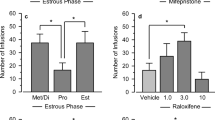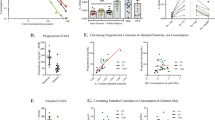Abstract
Rationale
Food restriction augments heroin seeking in chronically food-restricted male rats under withdrawal, an effect not yet examined in female rats. Importantly, women and female rats possess an increased vulnerability to drugs of abuse, which may be mediated by fluctuations in ovarian hormones.
Objectives
We investigated the role of estradiol and progesterone in augmented heroin seeking in chronically food-restricted female rats, under withdrawal.
Methods
Female rats self-administered heroin for 10–12 days and were then allowed unrestricted (sated) or restricted access to food (FDR; ∼10 % reduction in body weight) for 14 days. On day 14, rats underwent a heroin-seeking test. Exp. 1: Rats underwent ovariectomy or sham surgery and were treated with a low dose of estradiol (5.0 % in cholesterol; subcutaneous capsule). Exp. 2: Rats underwent ovariectomy and were administered with a high dose of estradiol (0.5 mg/kg; subcutaneous) for 8 days before testing. Exp. 3: Progesterone injections (2.0 mg/kg; subcutaneous) were administered 24 h and 2 h before testing.
Results
Food restriction resulted in augmented heroin seeking, compared to sated controls. While ovariectomy had no effect, estradiol replacement attenuated the food restriction effect. Injections of progesterone had no effect on heroin seeking in either the sated or FDR groups.
Conclusions
The effect of food restriction on heroin seeking in female rats under withdrawal is as robust as previously found in males. Interestingly, estradiol replacement, but not progesterone, attenuates the food restriction effect in the ovariectomized rats, possibly due to its anorexic properties.





Similar content being viewed by others
References
Almey A, Hafez NM, Hantson A, Brake WG (2013) Deficits in latent inhibition induced by estradiol replacement are ameliorated by haloperidol treatment. Front Behav Neurosci 7:136. doi:10.3389/fnbeh.2013.00136
Anker JJ, Carroll ME (2010) Sex differences in the effects of allopregnanolone on yohimbine-induced reinstatement of cocaine seeking in rats. Drug Alcohol Depend 107:264–267. doi:10.1016/j.drugalcdep.2009.11.002
Anker JJ, Larson EB, Gliddon LA, Carroll ME (2007) Effects of progesterone on the reinstatement of cocaine-seeking behavior in female rats. Exp Clin Psychopharmacol 15:472–480. doi:10.1037/1064-1297.15.5.472
Badiani A, Belin D, Epstein D, Calu D, Shaham Y (2011) Opiate versus psychostimulant addiction: the differences do matter. Nat Rev Neurosci 12:685–700. doi:10.1038/nrn3104
Becker JB, Hu M (2008) Sex differences in drug abuse. Front Neuroendocrinol 29:36–47. doi:10.1016/j.yfrne.2007.07.003
Bowman RE, Ferguson D, Luine VN (2002) Effects of chronic restraint stress and estradiol on open field activity, spatial memory, and monoaminergic neurotransmitters in ovariectomized rats. Neuroscience 113:401–410. doi:10.1016/S0306-4522(02)00156-2
Brady KT, Randall CL (1999) Gender differences in substance use disorders. Psychiatr Clin North Am 22:241–252. doi:10.1016/S0193-953X(05)70074-5
Butcher RL, Collins WE, Fugo NW (1974) Plasma concentration of LH, FSH, prolactin, progesterone and estradiol-17beta throughout the 4-day estrous cycle of the rat. Endocrinology 94:1704–1708. doi:10.1210/endo-94-6-1704
Carr KD (2007) Chronic food restriction: enhancing effects on drug reward and striatal cell signaling. Physiol Behav 91:459–472. doi:10.1016/j.physbeh.2006.09.021
Carroll ME (1985) The role of food deprivation in the maintenance and reinstatement of cocaine-seeking behavior in rats. Drug Alcohol Depend 16:95–109. doi:10.1016/0376-8716(85)90109-7
Carroll ME, Anker JJ (2010) Sex differences and ovarian hormones in animal models of drug dependence. Horm Behav 58:44–56. doi:10.1016/j.yhbeh.2009.10.001
Carroll ME, Campbell UC, Heideman P (2001) Ketoconazole suppresses food restriction-induced increases in heroin self-administration in rats: sex differences. Exp Clin Psychopharmacol 9:307–316. doi:10.1037/1064-1297.9.3.307
Cheskin LJ, Hess JM, Henningfield J, Gorelick DA (2005) Calorie restriction increases cigarette use in adult smokers. Psychopharmacology 179:430–436. doi:10.1007/s00213-004-2037-x
Cicero TJ, Aylward SC, Meyer ER (2003) Gender differences in the intravenous self-administration of mu opiate agonists. Pharmacol Biochem Behav 74:541–549. doi:10.1016/S0091-3057(02)01039-0
D’Cunha TM, Sedki F, Macri J, Casola C, Shalev U (2013) The effects of chronic food restriction on cue-induced heroin seeking in abstinent male rats. Psychopharmacology (Berl) 225:241–250. doi:10.1007/s00213-012-2810-1
Dallman MF (1999) Starvation: early signals, sensors, and sequelae. Endocrinology 140:4015–4023. doi:10.1210/en.140.9.4015
Donny EC, Caggiula AR, Rowell PP, Gharib MA, Maldovan V, Booth S et al (2000) Nicotine self-administration in rats: estrous cycle effects, sex differences and nicotinic receptor binding. Psychopharmacology (Berl) 151:392–405. doi:10.1007/s002130000497
Evans SM, Foltin RW (2010) Does the response to cocaine differ as a function of sex or hormonal status in human and non-human primates? Horm Behav 58:13–21. doi:10.1016/j.yhbeh.2009.08.010
Feltenstein MW, Byrd EA, Henderson AR, See RE (2009) Attenuation of cocaine-seeking by progesterone treatment in female rats. Psychoneuroendocrinology 34:343–352. doi:10.1016/j.psyneuen.2008.09.014
Feltenstein MW, Henderson AR, See RE (2011) Enhancement of cue-induced reinstatement of cocaine-seeking in rats by yohimbine: sex differences and the role of the estrous cycle. Psychopharmacology (Berl) 216:53–62. doi:10.1007/s00213-011-2187-6
Franklin JC, Shiele BC, Brozek J, Keys A (1948) Observations on human behavior in experimental semistarvation and rehabilitation. J Clin Psychol 4:28–45
Fuchs RA, Branham RK, See RE (2006) Different neural substrates mediate cocaine seeking after abstinence versus extinction training: a critical role for the dorsolateral caudate-putamen. J Neurosci 26:3584–3588. doi:10.1523/JNEUROSCI.5146-05.2006
Fuchs RA, Lasseter HC, Ramirez DR, Xie X (2008) Relapse to drug seeking following prolonged abstinence: the role of environmental stimuli. Drug Discov Today Dis Models 5:251–258. doi:10.1016/j.ddmod.2009.03.001
Griffin ML, Weiss RD, Mirin SM, Lange U (1989) A comparison of male and female cocaine abusers. Arch Gen Psychiatry 46:122–126. doi:10.1001/archpsyc.1989.01810020024005
Hall SM, Tunstall CD, Vila KL, Duffy J (1992) Weight gain prevention and smoking cessation: cautionary findings. Am J Public Health 82:799–803. doi:10.2105/AJPH.82.6.799
Hanna JM, Hornick CA (1977) Use of coca leaf in southern Peru: adaptation or addiction. Bull Narc 29:63–74
Jackson LR, Robinson TE, Becker JB (2006) Sex differences and hormonal influences on acquisition of cocaine self-administration in rats. Neuropsychopharmacology 31:129–138. doi:10.1038/sj.npp.1300778
Kerstetter KA, Aguilar VR, Parrish AB, Kippin TE (2008) Protracted time-dependent increases in cocaine-seeking behavior during cocaine withdrawal in female relative to male rats. Psychopharmacology (Berl) 198:63–75. doi:10.1007/s00213-008-1089-8
Kippin TE, Fuchs RA, Mehta RH, Case JM, Parker MP, Bimonte-Nelson HA et al (2005) Potentiation of cocaine-primed reinstatement of drug seeking in female rats during estrus. Psychopharmacology (Berl) 182:245–252. doi:10.1007/s00213-005-0071-y
Krahn D, Kurth C, Demitrack M, Drewnowski A (1992) The relationship of dieting severity and bulimic behaviors to alcohol and other drug use in young women. J Subst Abuse 4:341–353. doi:10.1016/0899-3289(92)90041-U
Lancaster FE, Spiegel KS (1992) Sex differences in pattern of drinking. Alcohol 9:415–420. doi:10.1016/0741-8329(92)90041-8
Larson EB, Roth ME, Anker JJ, Carroll ME (2005) Effect of short- vs. long-term estrogen on reinstatement of cocaine-seeking behavior in female rats. Pharmacol Biochem Behav 82:98–108. doi:10.1016/j.pbb.2005.07.015
Lu L, Shepard JD, Hall FS, Shaham Y (2003) Effect of environmental stressors on opiate and psychostimulant reinforcement, reinstatement and discrimination in rats: a review. Neurosci Biobehav Rev 27:457–491. doi:10.1016/S0149-7634(03)00073-3
Lynch WJ, Carroll ME (1999) Sex differences in the acquisition of intravenously self-administered cocaine and heroin in rats. Psychopharmacology (Berl) 144:77–82. doi:10.1007/s002130050979
Lynch WJ, Roth ME, Carroll ME (2002) Biological basis of sex differences in drug abuse: preclinical and clinical studies. Psychopharmacology (Berl) 164:121–137. doi:10.1007/s00213-002-1183-2
Macenski MJ, Meisch RA (1999) Cocaine self-administration under conditions of restricted and unrestricted food access. Exp Clin Psychopharmacol 7:324–337. doi:10.1037/1064-1297.7.4.324
Marinelli M, Le M, Michel, Piazza PV (1996) Acute pharmacological blockade of corticosterone secretion reverses food restriction-induced sensitization of the locomotor response to cocaine. Brain Res 724:251–255. doi:10.1016/0006-8993(96)00309-5
Piazza PV, Le Moal M (1998) The role of stress in drug self-administration. Trends Pharmacol Sci 19:67–74. doi:10.1016/S0165-6147(97)01115-2
Pisetsky EM, Chao YM, Dierker LC, May AM, Striegel-Moore RH (2008) Disordered eating and substance use in high-school students: results from the Youth Risk Behavior Surveillance System. Int J Eat Disord 41:464–470. doi:10.1002/eat.20520
Rogers JL, Ghee S, See RE (2008) The neural circuitry underlying reinstatement of heroin-seeking behavior in an animal model of relapse. Neuroscience 151:579–588. doi:10.1016/j.neuroscience.2007.10.012
Sedki F, Abbas Z, Angelis S, Martin J, D’Cunha T, Shalev U (2013a) Is it stress? The role of stress related systems in chronic food restriction-induced augmentation of heroin seeking in the rat. Front Neurosci 7:98. doi:10.3389/fnins.2013.00098
Sedki F, D’Cunha T, Shalev U (2013b) A procedure to study the effect of prolonged food restriction on heroin seeking in abstinent rats. J Vis Exp. doi:10.3791/50751
Shalev U, Finnie PS, Quinn T, Tobin S, Wahi P (2006) A role for corticotropin-releasing factor, but not corticosterone, in acute food-deprivation-induced reinstatement of heroin seeking in rats. Psychopharmacology 187:376–384. doi:10.1007/s00213-006-0427-y
Sinha R, Fox H, Hong KI, Sofuoglu M, Morgan PT, Bergquist KT (2007) Sex steroid hormones, stress response, and drug craving in cocaine-dependent women: implications for relapse susceptibility. Exp Clin Psychopharmacol 15:445–452. doi:10.1037/1064-1297.15.5.445
Stewart J, Woodside B, Shaham Y (1996) Ovarian hormones do not affect the initiation and maintenance of intravenous self-administration of heroin in the female rat. Psychobiology 24:154–159
Stuber GD, Evans SB, Higgins MS, Pu Y, Figlewicz DP (2002) Food restriction modulates amphetamine-conditioned place preference and nucleus accumbens dopamine release in the rat. Synapse 46:83–90. doi:10.1002/syn.10120
Tomiyama AJ, Mann T, Vinas D, Hunger JM, Dejager J, Taylor SE (2010) Low calorie dieting increases cortisol. Psychosom Med 72:357–364. doi:10.1097/PSY.0b013e3181d9523c
Wade GN (1975) Some effects of ovarian hormones on food intake and body weight in female rats. J Comp Physiol Psychol 88:183–193. doi:10.1037/h0076186
Walf AA, Frye CA (2005) Antianxiety and antidepressive behavior produced by physiological estradiol regimen may be modulated by hypothalamic-pituitary-adrenal axis activity. Neuropsychopharmacology 30:1288–1301. doi:10.1038/sj.npp.1300708
Acknowledgments
This work was supported by the Natural Sciences and Engineering Council Discovery Program (US: 298915), the Fonds de recherche du Quebec—Santé (CSBN), and the Canada Research Chairs program (US). We thank Drs. Wayne Brake and James Pfaus and Mr. Waqqas Shams for the generous contribution of progesterone and estradiol, and guidance in the construction of estradiol capsules. We also thank Mr. Dean Graham and Dr. Mayte Parada, and for their invaluable help with the ovariectomy surgeries.
Compliance with Ethical Standards
Rats used in this study were treated according to the Canadian Council on Animal Care Guidelines, and approval was granted by the Concordia University Animal Research Ethics Committee.
Author information
Authors and Affiliations
Corresponding author
Rights and permissions
About this article
Cite this article
Sedki, F., Gardner Gregory, J., Luminare, A. et al. Food restriction-induced augmentation of heroin seeking in female rats: manipulations of ovarian hormones. Psychopharmacology 232, 3773–3782 (2015). https://doi.org/10.1007/s00213-015-4037-4
Received:
Accepted:
Published:
Issue Date:
DOI: https://doi.org/10.1007/s00213-015-4037-4




